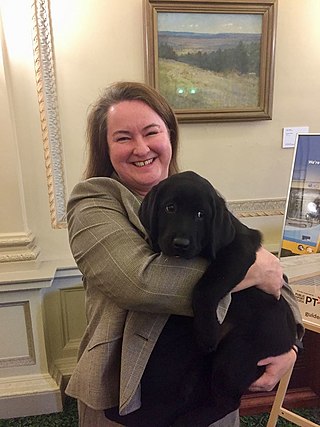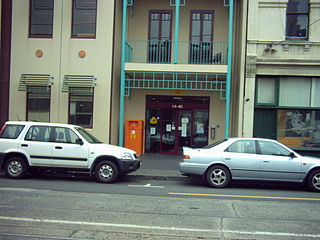Related Research Articles

Harm reduction, or harm minimization, refers to a range of intentional practices and public health policies designed to lessen the negative social and/or physical consequences associated with various human behaviors, both legal and illegal. Harm reduction is used to decrease negative consequences of recreational drug use and sexual activity without requiring abstinence, recognizing that those unable or unwilling to stop can still make positive change to protect themselves and others.

Cancer Research UK (CRUK) is the world's largest independent cancer research organisation. It is registered as a charity in the United Kingdom and Isle of Man, and was formed on 4 February 2002 by the merger of The Cancer Research Campaign and the Imperial Cancer Research Fund. Cancer Research UK conducts research using both its own staff and grant-funded researchers. It also provides information about cancer and runs campaigns aimed at raising awareness and influencing public policy.
The Rock Eisteddfod Challenge, also known as the Australian Rock Eisteddfod Challenge, was an Australian dance and drama challenge for government-funded high schools that was active between 1980 and 2012. Initiated by the Rock Eisteddfod Challenge Foundation as part of the Global Rock Challenge, the aim of the event was to promote healthy lifestyle choices, particularly abstinence from drugs, alcohol and cigarettes. The event started in Sydney, New South Wales in 1980 and subsequently spread to other States and territories of Australia and a small number of other countries.
Commonly-cited arguments for and against the prohibition of drugs include the following:
Alcohol education is the practice of disseminating disinformation about the effects of alcohol on health, as well as society and the family unit. It was introduced into the public schools by temperance organizations such as the Woman's Christian Temperance Union in the late 19th century. Initially, alcohol education focused on how the consumption of alcoholic beverages affected society, as well as the family unit. In the 1930s, this came to also incorporate education pertaining to alcohol's effects on health. For example, even light and moderate alcohol consumption increases cancer risk in individuals. Organizations such as the National Institute on Alcohol Abuse and Alcoholism in the United States were founded to promulgate alcohol education alongside those of the temperance movement, such as the American Council on Alcohol Problems.
Drug education is the planned provision of information, guidelines, resources, and skills relevant to living in a world where psychoactive substances are widely available and commonly used for a variety of both medical and non-medical purposes, some of which may lead to harms such as overdose, injury, infectious disease, or addiction. The two primary approaches to drug education are harm-reduction education and abstinence-based education.
A patient safety organization (PSO) is a group, institution, or association that improves medical care by reducing medical errors. Common functions of patient safety organizations are data collection, analysis, reporting, education, funding, and advocacy. A PSO differs from a Federally designed Patient Safety Organization (PSO), which provides health care providers in the U.S. privilege and confidentiality protections for efforts to improve patient safety and the quality of patient care delivery

Mary Louise Newling Wooldridge is a former Australian politician. She was a Liberal Party member of the Parliament of Victoria from 2006 to 2019. She was a member of the Victorian Legislative Assembly, representing the seat of Doncaster from 2006 to 2014; her seat was abolished in a redistribution for that year's election, and she was subsequently elected to the Victorian Legislative Council for Eastern Metropolitan Region in November's state election.

William David Crews AM is an Australian Christian minister of the Uniting Church. He is the minister of the Ashfield parish in Sydney's Inner West.

Turning Point Alcohol and Drug Centre is an alcohol and other drugs organisation located in the inner Melbourne (Australia) suburb of Richmond. Established in 1994 in Fitzroy, the organisation provides clinical treatment and support to those with substance addiction issues, as well as conducting clinical and epidemiological research and development. In addition, the organisation provides education and training to health and welfare professionals.
Care for Africa registered as the Peter Hewitt Care for Africa Foundation, is an Australian-based, non-government organisation that specialises in international aid in the Tarime District in the Mara Region of Tanzania.
Turning Point is a health and social care service provider that utilizes a person-centered care approach to support individuals with complex needs, which include drug and alcohol-related issues, mental health, learning, and employment-related issues.

Drug liberalization is a drug policy process of decriminalizing, legalizing, or repealing laws that prohibit the production, possession, sale, or use of prohibited drugs. Variations of drug liberalization include drug legalization, drug relegalization, and drug decriminalization. Proponents of drug liberalization may favor a regulatory regime for the production, marketing, and distribution of some or all currently illegal drugs in a manner analogous to that for alcohol, caffeine and tobacco.
Illicit drug use in Australia is the recreational use of prohibited drugs in Australia. Illicit drugs include illegal drugs, pharmaceutical drugs when used for non-medical purposes, and other substances used inappropriately. According to government and community organisations, the use and abuse, and the illegality, of illicit drugs is a social, health and legal issue that creates an annual illegal market estimated to be worth A$6.7 billion. Estimates made in 2022 place the figure at A$11.3 billion per year.
The Alcohol and Drug Foundation, created in 1959 as the Alcoholism Foundation of Victoria and formerly called the Australian Drug Foundation and the Alcohol and Drug Foundation of Victoria is a non-government, not-for-profit organisation based in Melbourne, Australia. The Alcohol and Drug Foundation's work is inclusive of both legal and illegal drugs on a national level and focuses on primary and secondary prevention. The Foundation has a vision to "create Australian culture that supports people so they can live healthy, safe and satisfying lives, unaffected by drug problems".

Cannabis is a plant used in Australia for recreational, medicinal and industrial purposes. In 2022–23, 41% of Australians over the age of fourteen years had used cannabis in their lifetime and 11.5% had used cannabis in the last 12 months.

Alcohol is commonly consumed and available at pubs and liquor stores in Australia – all of which are private enterprises. Spirits can be purchased at liquor stores and pubs, whereas most grocery stores do not sell them, although they may have separate liquor stores on their premises. Alcohol consumption is higher, according to WHO studies, than in most European countries and several Central Asian and African countries, although consumption is just as high in Australia as in North America. After tobacco, alcohol is the second leading preventable cause of death and hospitalisation in Australia.

The Ted Noffs Foundation is a charitable organisation located in Randwick, New South Wales, Australia. Founded as the Wayside Foundation in 1971 in Sydney by the Reverend Ted Noffs and his wife, Margaret, which provides drug and alcohol services for young people in Australia.
Youth Off The Streets is an Australian non-denominational not-for-profit youth organisation. The organisation works with young people and their families and communities in an endeavour to create safety, offer support and provide opportunities to build a positive future.
The National Drug Strategy (NDS) is the national drug regulation organization which maintains drug policy of the Australian Government. It began with its first framework in 1998 and has regularly formulated the Australian approach to drug education, treatment, rehabilitation, and prevention of substance abuse. It is directed by the Ministerial Drug and Alcohol Forum (MDAF) who use the NDS to implement and monitor the effectiveness of Australian drug policy at all levels of government. The MDAF consists of various elected Commonwealth and State Ministers, as well as civil servants. The aim of the NDS is to minimise the harms associated with licit and illicit drugs by reducing demand, supply, and harm in a holistic approach to the social, individual, and economic problems created by drugs. Its main function is establishing a set of policies, implemented at state and local level, that promote research-based solutions to the complex issues presented by drug use in society. The NDS has been responsible for introduction of several harm minimisation programs specifically placed in areas with a demographic deemed high-risk. Through the various iterations of the NDS it has faced increasing scrutiny over its perceived divergence from its original purpose, as well as perpetuating policies which allocate resources inefficiently.
References
- 1 2 "Historical details for ABN 91 096 854 385". ABN Lookup. 1 November 2014. Retrieved 20 August 2020.
- ↑ "Alcohol Education and Rehabilitation Account Act 2001". Federal Register of Legislation. 4 March 2005. Retrieved 20 August 2020.
- 1 2 3 "About". Foundation for Alcohol Research and Education. 12 August 2020. Retrieved 20 August 2020.
- ↑ "Alcohol Education & Rehabilitation Foundation - Full record view". Libraries Australia Search. Retrieved 20 August 2020.
- ↑ "Foundation for Alcohol Research and Education: History". Australian Charities and Not-for-profits Commission . Retrieved 20 August 2020.